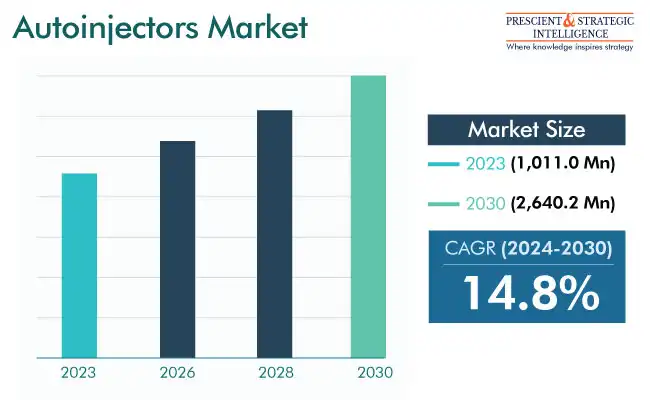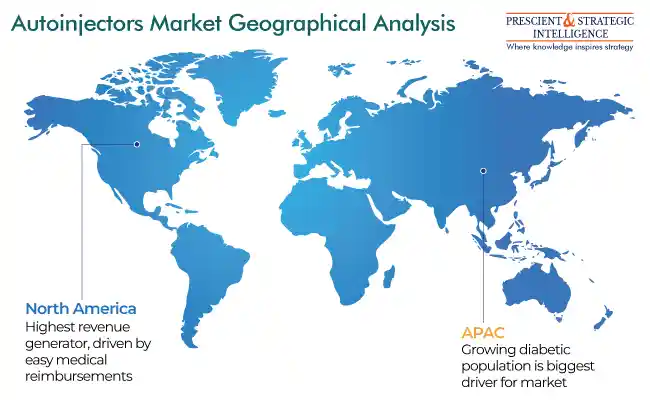Report Code: 10941 | Available Format: PDF
Auto-Injectors Market Size & Share Analysis - Global Development and Demand Forecast to 2030
- Report Code: 10941
- Available Format: PDF
- Report Description
- Table of Contents
- Request Free Sample
Auto-Injectors Market Size & Share
The global auto injectors market was valued at USD 1,011 million in 2023, and it will grow at a rate of 14.8% through this decade, to reach USD 2,640.2 million in 2030.
The major factors propelling the industry development include the growing need for the ease of drug administration, increasing occurrence of chronic and lifestyle-related illnesses, and advancing healthcare technologies. As per the World Health Organization (WHO), more than 16 billion injections are given yearly around the world. Therefore, the increasing need for ease and safety during the procedure is fueling the market advance.

Additionally, the WHO projects a 57% increase in the prevalence of chronic diseases in the upcoming years, with 60% of this surge expected in emerging markets. Various types of chronic illnesses are identified as the primary contributors to global disability and morbidity. The Global Cancer Observatory report, for instance, reveals that in 2020, there were 19,292,789 new cancer cases diagnosed and 9,958,133 deaths globally.
Additionally, as per the International Diabetes Federation, diabetes impacts around 536 million people in the age group of 20 to 79. By 2030, the worldwide diabetic population is projected to touch 643 million; by 2045, it will touch 783 million. 3 out of every 4 adults with diabetes live in a low- or middle-income nations.
Furthermore, in 2021, approximately 10 million individuals experienced tuberculosis on a global scale, says the WHO. This comprised 5.6 million men, 3.3 million women, and 1.1 million children. Tuberculosis is a health concern affecting individuals across various age groups and geographical locations. In 2020, the 30 nations most heavily impacted by tuberculosis were responsible for 86% of the new cases.
India dominated the list with two-thirds of the total, tailed by Indonesia, China, Pakistan, the Philippines, Bangladesh, and Nigeria. Therefore, the surge in the count of chronic illness cases fuels the industry development as injections are needed frequently to treat or handle them or their symptoms.
Advantages of Auto-Injectors over Conventional Syringes Propel Market
The emergence of auto-injectors has brought numerous advantages for both patients and healthcare professionals, by making self-administration simpler, lessening anxiety, enhancing safety, and improving compliance. For instance, needlestick wounds during drug administration can lead to blood-borne pathogen spread; thus, healthcare workforces can witness anxiety, fear, and emotional suffering. This danger related to the utilization of conventional syringes is decreased by utilizing auto-injectors.
The healthcare sector in several nations is complying with the compulsory use of devices with needlestick prevention features. Essentially, the growing knowledge regarding accidental needlestick wounds is leading to an augmenting focus on occupational safety. Efforts to achieve safety from needlestick injuries is the key worry for governing bodies, since the count of such mishaps among healthcare workers is on the surge.
For example, the WHO hosts and manages the Safe Injection Global Network (SIGN) to encourage and sustain injection safety globally. Additionally, given the significant potential in the market, many industry participants are employing diverse approaches, including partnerships, acquisitions, product introductions, and operational expansions.
Rheumatoid Arthritis Expected To Hold Significant Market Share
Based on application, the rheumatoid arthritis category will hold a significant share over this decade. Rheumatoid arthritis is an autoimmune illness in which the body's immune system attacks the joints, resulting in the irritation of the synovium and inflammation and pain in and around the joints. It mainly disturbs the aging populace, with females being more prone and displaying advanced occurrence than males.
As per the United Nations’ World Population Prospects report, 728 million individuals are aged 65 years or more, and this count is projected to double by 2050. As arthritis is more widespread in the elderly populace, its growth is projected to drive the market revenue in this category during the projection period. Further, several recent studies indicate that the majority of the rheumatoid arthritis patients using an auto-injector find the device comfortable show better outcomes than those relying on others for injections. Therefore, market players are taking several initiatives to target this patient base.
For example, in March 2022, NORDIC PHARMA submitted a Novel Drug Submission to Health Canada for its methotrexate auto-injector, Nordimet. The drug is designed for the management of severe, incapacitating active rheumatoid arthritis. Moreover, it is also meant to manage the symptoms of severe disabling psoriasis in adults who are not responding adequately to other treatments. The expected authorization of these medications is set to enhance the market expansion potential.
| Report Attribute | Details |
Market Size in 2023 |
USD 1,011 Million |
Revenue Forecast in 2030 |
USD 2640.2 Million |
Growth Rate |
14.8% CAGR |
Historical Years |
2017-2023 |
Forecast Years |
2024-2030 |
Report Scope |
Market Trends, Drivers, and Restraints; Revenue Estimation and Forecast; Segmentation Analysis; Impact of COVID-19; Companies’ Strategic Developments; Market Share Analysis of Key Players; Company Profiling |
Explore more about this report - Request free sample
Disposable Category Holds Larger Market Share
Autoinjectors are divided into disposable and reusable on the basis of their usage. In recent years, the disposable bifurcation held the larger share attributed to the lower risk of cross-contamination with these variants. Especially since the pandemic, the need for disposable and single-use medical devices has risen as a means to prevent healthcare-associated infections, which are a significant burden for both patients and the healthcare community. Additionally, most of the auto-injectors are currently available as disposable devices, which is another reason for this category’s larger share.
Auto-Injectors that Deliver Drugs Subcutaneously Are Preferred
The subcutaneous route of administration is preferred over its intramuscular counterpart because the former ensures longer drug availability in the body and its easier absorption. Moreover, subcutaneous variants are specifically designed for home use, such as by people with mobility disorders and the elderly.
North America Is Dominating Market
The market is currently led by North America, and this prominent position is expected to persist during the projection period. This is because the continent provides ready reimbursement for the use of autoinjectors. Moreover, the increasing incidence of anaphylactic shock is likely to encourage the adoption of auto-injectors filled with epinephrine (adrenaline). Additionally, the two countries in the region exhibit a high level of awareness regarding self-administration drug delivery devices.

Fastest Market Growth Expected in APAC
The highest market CAGR is expected in the APAC region, primarily due to the burgeoning incidence of diabetes. Since diabetics require regular insulin administration, auto-injectors save them the trouble of visiting a doctor every time and, thus, make them independent. Additionally, the rising incidence of severe reactions due to food allergies is propelling the demand for epinephrine injections.
Moreover, the booming geriatric population is driving the popularity of home-based care. Seeing the opportunities presented by a large patient base and governments’ initiatives to make healthcare more accessible, auto-injector providers are making concrete efforts to market their products in China, India, Japan, and other regional nations.
Recent Developments
In July 2022, Pfizer and Mylan launched a generic EpiPen variant to save the lives of people suffering from anaphylaxis. The product is available at a 30% lower price than the patented product.
In August 2021, Midas Pharma and Gerresheimer AG entered into a partnership to develop and supply a new 3-mL autoinjector for subcutaneous drug administration.
Auto-Injectors Producing Top Companies
- Eli Lilly and Company
- Pfizer Inc.
- Novartis International AG
- Mylan N.V.
- Bristol-Myer-Squibb
- Teva Pharmaceutical Industries Ltd.
- Johnson & Johnson Services Inc.
- GlaxoSmithKline plc
- Becton, Dickinson & Company
- Amgen Inc.
- Novartis AG
- Bayer AG
- AbbVie Inc.
- AstraZeneca plc
- Biogen Inc.
- Merck KGaA
- Sanofi S.A.
- Ypsomed AG
- Gerresheimer AG
- Stevanato Group
- Antares Pharma Inc.
Want a report tailored exactly to your business strategy?
Request CustomizationWant an insight-rich discussion with the report author?
Speak to AnalystOur dedication to providing the most-accurate market information has earned us verification by Dun & Bradstreet (D&B). We strive for quality checking of the highest level to enable data-driven decision making for you
Our insights into the minutest levels of the markets, including the latest trends and competitive landscape, give you all the answers you need to take your business to new heights
With 24/7 research support, we ensure that the wheels of your business never stop turning. Don’t let time stand in your way. Get all your queries answered with a simple phone call or email, as and when required
We take a cautious approach to protecting your personal and confidential information. Trust is the strongest bond that connects us and our clients, and trust we build by complying with all international and domestic data protection and privacy laws